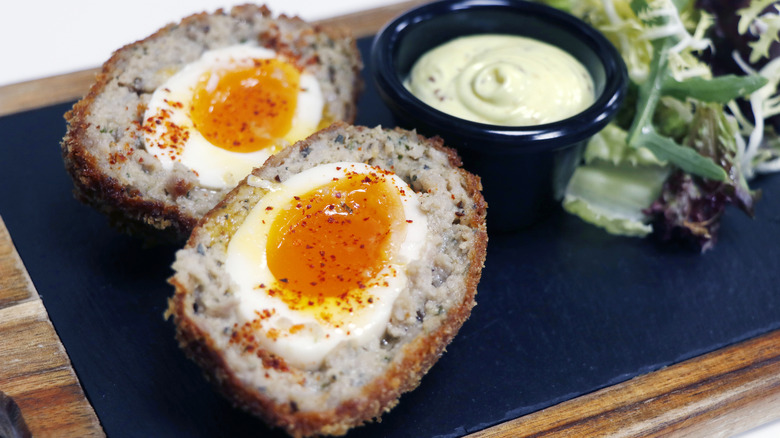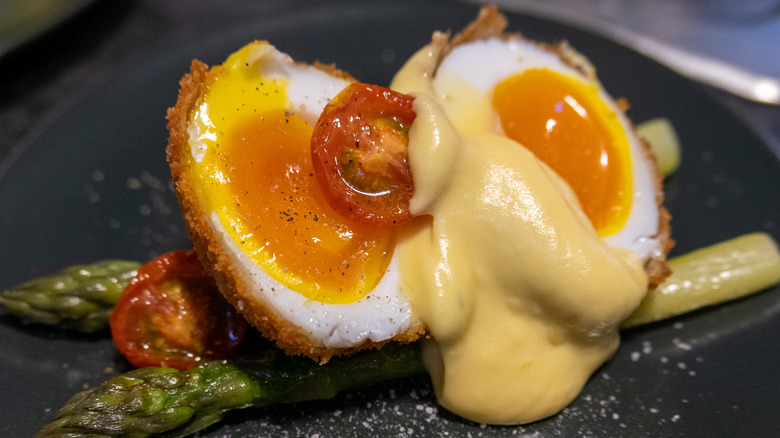What Exactly Is A Scotch Egg?
If you stroll into a pub or through campgrounds across the U.K., you'll find quite a few people snacking on what look like meatballs with boiled eggs inside. This tasty snack, called a Scotch egg (or sometimes just a "Scottie"), has been a favorite with Brits since at least the 18th century when it was described in Maria Rundell's 1809 cookbook "A New System of Domestic Cookery." Making one is simple: Just take a boiled egg — soft or hard is fine — and pack it in sausage meat. Then coat it with breadcrumbs and fry it until it's golden brown. You can find these crispy treats sold pretty much everywhere in the U.K., from pubs to picnic spots to food markets.
As for the history of Scotch eggs, you might assume that this is a "Scotch whiskey from Scotland" situation and that it's a snack from the bonnie Highlands. Surprisingly, it's not that straightforward. The truth is, there are many stories about where Scotch eggs came from, and depending on which one you believe, they could have originated anywhere from England to North Africa to India.
The origin of Scotch eggs is largely still a mystery
Scotch eggs' origin is a topic of much debate among food historians, with several competing theories vying for recognition. One popular story attributes their creation to the iconic London department store Fortnum & Mason in 1738. In fact, the store's website features a whole page laying claim to the snack's invention; however, the page also references a Mughlai dish known as nargisi kofta, suggesting this may have inspired the sausage-and-egg creation.
Nargisi kofta and Scotch eggs do share similarities, as both feature spiced minced meat wrapped around a boiled egg. If this theory is to be believed, the idea for this snack could have originated in India before making its way to Britain through the infamous East India Company. Some people, however, like Annette Hope in her 1987 book "A Caledonian Feast," view this connection more as a coincidence than a definitive claim.
Competing theories also persist. One story suggests that the practice of encasing boiled eggs in meat may have originated in North Africa alongside similar dishes like shakshuka. It's said that during the 16th century, this recipe traveled from France to Britain, where it eventually metamorphosed into Scotch eggs. Interestingly, this version describes early Scotch eggs as heavily spiced to mask the taste of low-quality meat.
If it's not Scottish, then why is it called a Scotch egg?
While dates, locations, and events all vary between prevailing theories, a common thread ties them together: None of them point to Scotland as Scotch eggs' birthplace. Indeed, there are minimal (if any) connections between the two. The development, evolution, and eventual popularization of this snack primarily took place in England, making it more accurately an English dish.
So, why the name? According to Fortnum & Mason, "Scotch" here isn't a reference to Scotland. Instead, it relates to a cooking technique known as "scotching," in which anchovies are added to meat to offset its fatty taste. Not even this part of the story, however, is clear-cut. According to the Foods of England Project, news clippings from 1848 mention a practice in the egg trade between England and Scotland wherein fresh eggs were coated in lime for preservation during transit. And what were these lime-coated eggs called? That's right — Scotch eggs. The lime coating may have served as inspiration for the sausage meatball.
In the end, the exact origin of these eggs is still unclear, but they most definitely didn't come from Scotland. Hopefully, though, this won't deter you from whipping up a batch of Scotch eggs at home and giving them a try.


